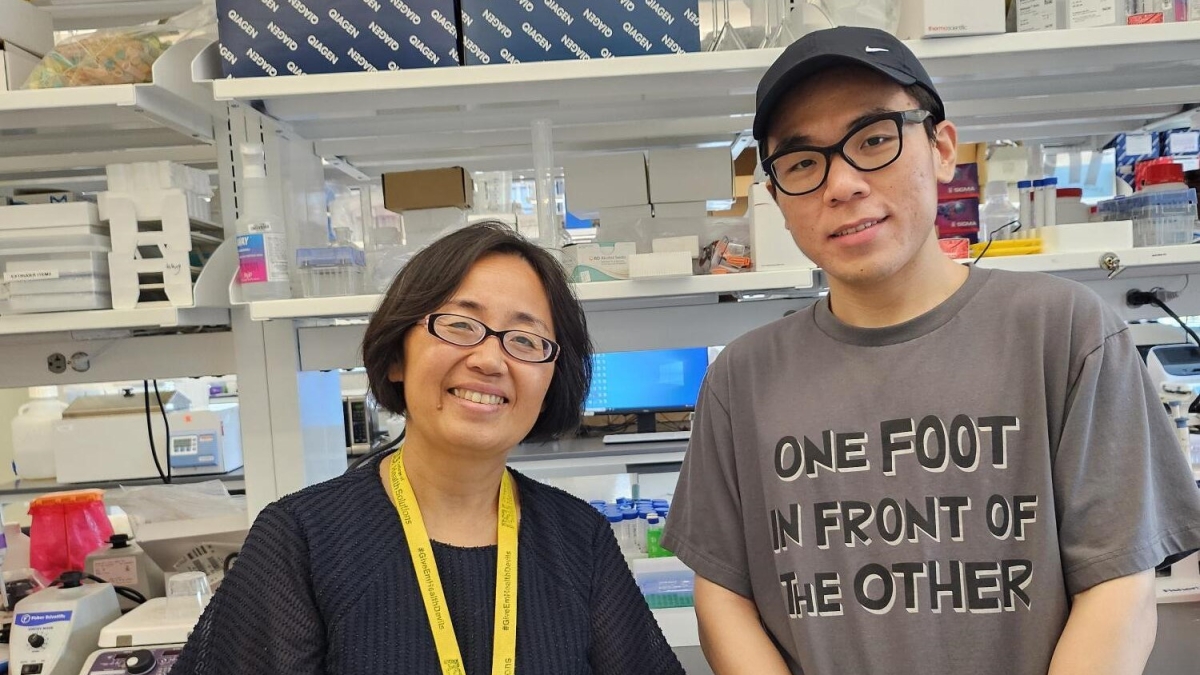From watching presentation year after year, Fang Zhou finally got to present his research
By Aidan Hansen
For College of Health Solutions doctoral student Fang Zhou, presenting an in-depth research project about nanocarrier functions as an international student at one of the nation’s premier nutritional conferences filled him with nervousness and honor.
When he got the email stating he was one of the Graduate Student Research Award Competition finalists, he immediately went to his mentor, College of Health Solutions Professor Shu Wang, to talk to her about it.
Zhou and Wang’s research project started because of a combined interest in both nanoparticles, phytochemicals, and obesity.
After going to the past two annual conferences, Zhou wanted to be a presenter of a research project. When he got the email three weeks before the conference began, he practiced his presentation with Wang.
“I felt very nervous,” Zhou said. “I quickly went to my mentor’s lab office to talk with her and get tips and advice from her years of experience. I was really nervous, but I also felt very honored that I was chosen.”
He presented his research along with five other finalists on June 29, 2024.
“Presenting felt pretty good, and I won first place in the post-presentation for the research,” Zhou said. “Something else that was really interesting is that I was the only student of the graduate student research award finalists from ASU at the conference and after I presented there were so many other professors that I got to meet from ASU and get to talk to about their research.”
After mentoring him for the past three years, Wang says that watching a student grow and succeed is always very rewarding.
One of the reasons that Wang thought Zhou was chosen to present the research project is according to her because Zhou’s work is impactful and has a high quality. Also, this research project is innovative, and both Zhou and Wang are pioneers in applying nanotechnology in the nutrition field in the US.
“To improve solubility and delivery efficacy of phytochemicals is an emerging topic, and also our work is innovative by using this technology in the nutrition field,” Wang said. “Our group is a pioneer group, and it can have a huge impact if the result is good by improving human health.”
Zhou came to ASU from his home country, China, in 2021 with a master’s degree in food science and nutritional engineering from China Agricultural University in Beijing. He reached out to Wang, who he found through a Google search and by reading her research papers, to further his education and fulfill his passion for research.
“I emailed her and let her know I had just graduated and got my master’s degree,” Zhou said. “We had a couple of interviews with each other and talked about my research interests and my future goals, and we both felt pretty good. That’s when she decided to admit me into the PhD program.”
The research Zhou presented, according to the nutrition lab website, uses “biocompatible and biodegradable nanocarriers to enhance bioactivities of nutrients and phytochemicals for the prevention and treatment of chronic diseases, especially cardiovascular disease, obesity and Type II diabetes.”
Zhou and Wang were able to conduct this study by using the obese mouse model. Over several weeks, the mice are given a high-fat diet that makes them obese. The nanocarriers carry nutrients and phytochemicals that can be delivered into the mouse body.
The reason for this study is, according to Wang, the human body does absorb nutrients from food and supplements, but most phytochemicals/bioactive compounds from fruits, vegetables or dietary supplements cannot be absorbed well.
“I know there is an issue with these phytochemicals/bioactive compounds,” Wang said. “One issue is they have low solubility. For example, if someone takes a big pill of resveratrol, (a phytochemical which according to an article by healthline.com can have benefits such as possibly easing joint pain, and suppressing cancer cells) a minimal amount of that pill is soluble. If it’s not soluble, it cannot be absorbed.”
Wang eventually wants this research project to branch into a new drug entirely, which according to her could take up to 10 years.
She says her main motivation for this research is that she wants to find an innovative strategy for improving human health, especially obesity, diabetes and other metabolic diseases.

